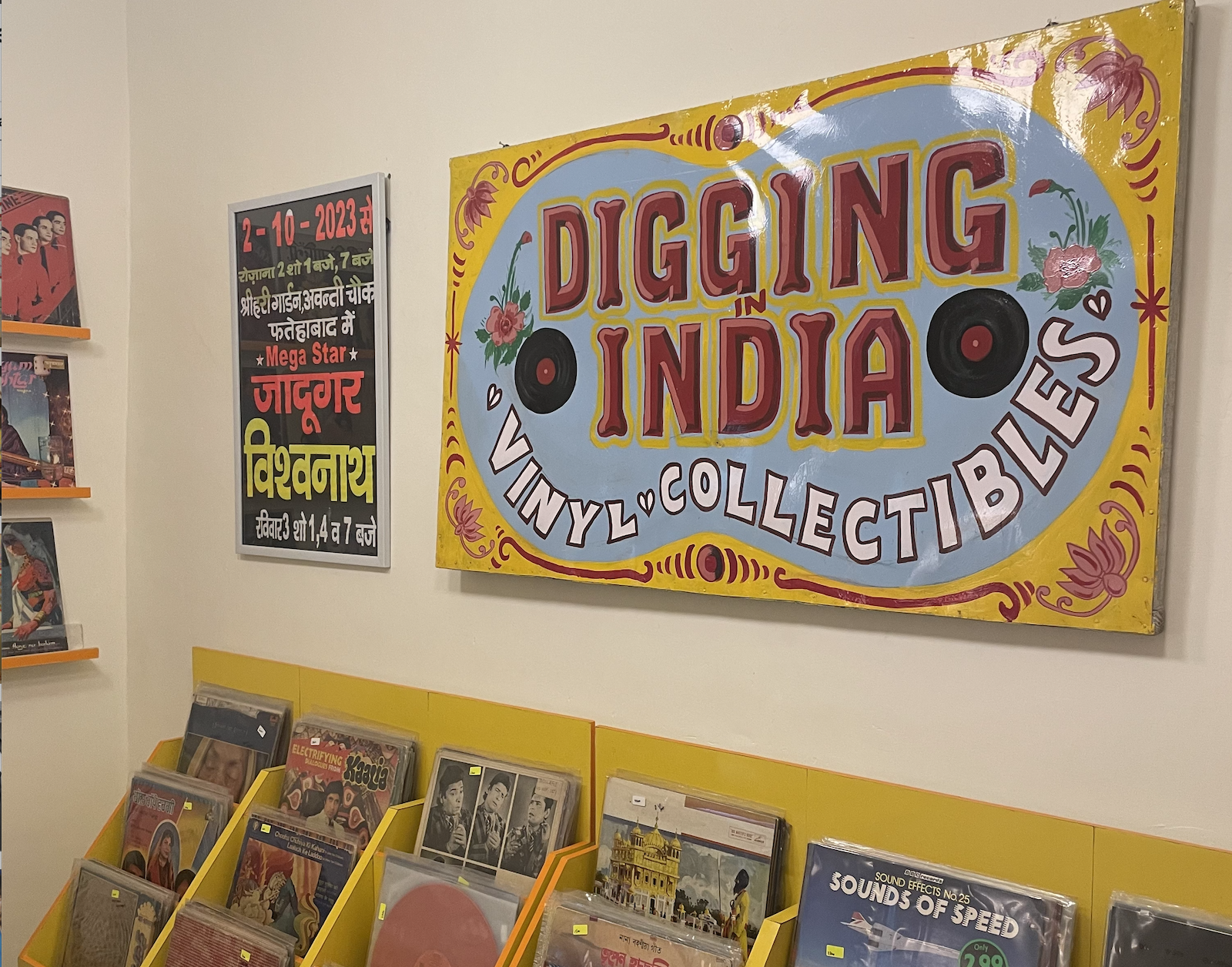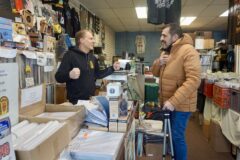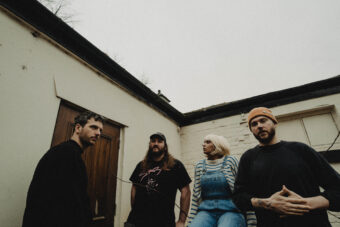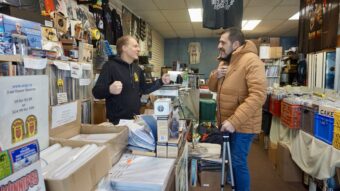Nostalgia is the driving force behind Digging in India, the New Delhi-based record store and cakery from DJ, archivist, and record collector Nishant Mittal and pastry chef Mallika Tandon.
When you walk inside, you’re greeted by a glossy yellow and pink sign with the shop’s name, which is also Mittal’s Instagram alias. Tandon designed it and recruited a painter who makes signs for Indian trucks (which are often decorated with vibrant, instantly recognizable floral prints). On the walls, posters for magic shows and educational fliers that an Indian student would recognize from a textbook—guides to types of rocks and seed germination—hang in cherry red frames. “The store is very anti-minimalist,” Mittal says. “There’s stuff everywhere. It’s very much the Indian home aesthetic, the Indian street aesthetic.”
The food, too, is based on the tastes of Tandon’s childhood. She is a pastry chef who transforms artwork like Claude Monet’s Water Lilies or Mondrian paintings into gorgeous, brightly colored cakes. “Wenger’s is an iconic Delhi shop that does a swiss roll with chocolate and nuts,” Tandon says. “I want to make a version of that which serves my childhood memory but is more elevated. I also want to use Indian seasonal fruits in desserts like mango shortbread or mango tiramisu.”
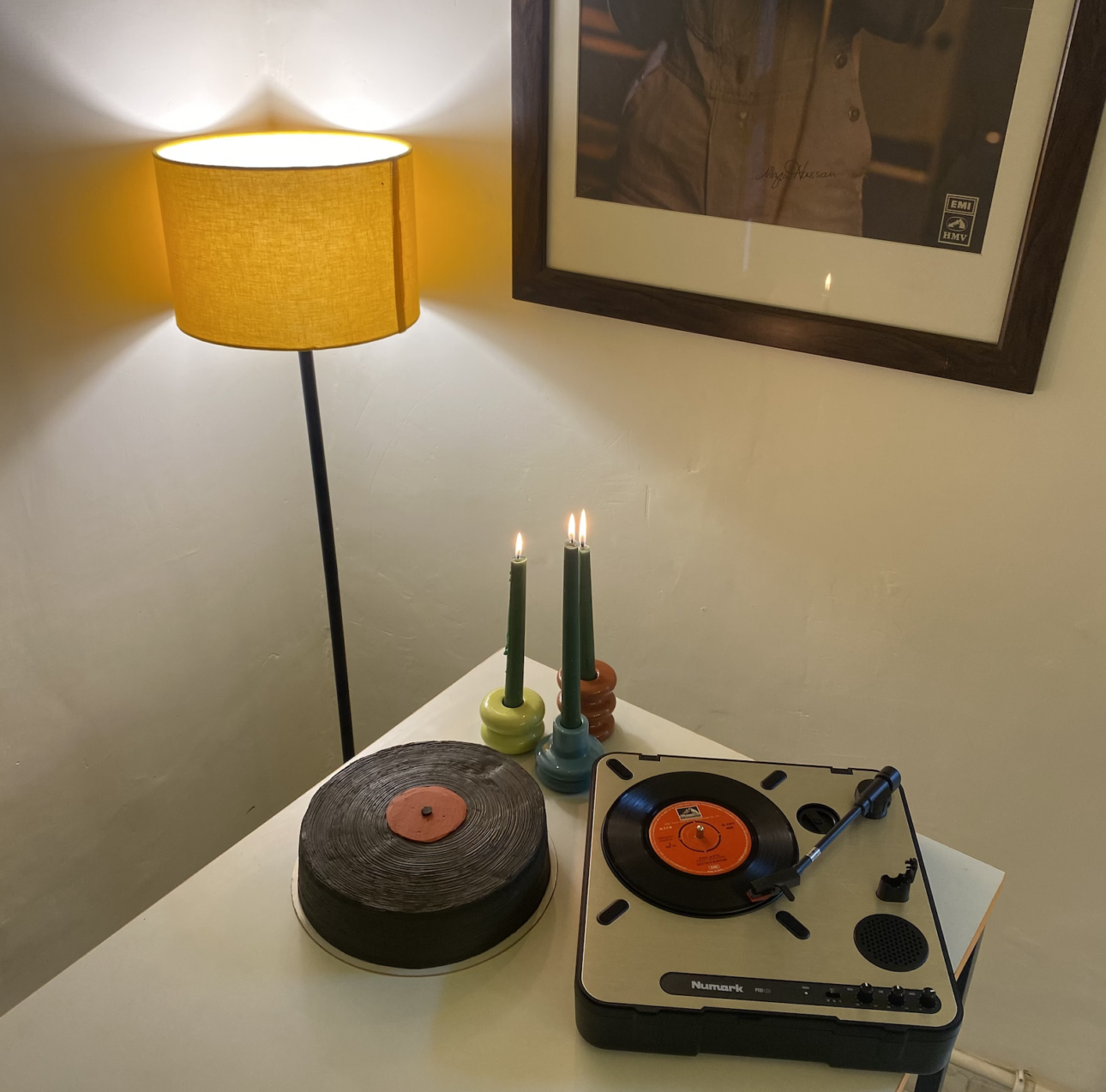
Together, Mittal and Tandon, who have been dating for seven years, want to create a record store driven by positive vibes. Interesting music is always playing, and Tandon notes that, as you amble around the store, you can eat “really carefully considered, beautiful, delicious food.”
The shop’s nostalgia theme is fitting. As an archivist and record collector, Mittal has a deep understanding and passion for South Asian music of the past. Peruse his Instagram account for just a few minutes and you’ll witness continents and decades fold over on themselves. One second you might be reading liner notes for Alice Coltrane’s album Radha Krsna Nama Sankirtana, and the next you’ll discover an obscure 1986 Indian record that fuses Tamil pop with Christian funk. Scroll just a bit further and you’ll learn the history of Hafeez Hoshiarpuri’s poem “Mohabbat,” most recently adapted by Pakistani American singer Arooj Aftab, who won a Grammy for her song adaptation.
In addition to running his Instagram, Mittal plays Indian psychedelic and funk music on NTS Radio and at festivals like Magnetic Fields, hosts listening sessions across India, and is one of the frontrunners of the recent vinyl resurgence in his home city of New Delhi. His deep love of avant garde and experimental music drives him to find and archive fascinating, forgotten bits of South Asian musical history. He spotlights the minutiae of these sounds—a meandering saxophone solo or an unusual drum break— while also contextualizing the histories and outputs of entire movements, like India’s 1960s rock scene. A few years ago in New Delhi, when he sold me some records that he was selling out of his and Tandon’s apartment in Hauz Khas at the time, it was clear just how vast his knowledge is: I left with a Hindi-language album of re-interpreted Madonna songs, Nazia Hassan and Runa Laila hits, the Meera soundtrack that Jai Paul samples on “Str8 Outta Mumbai,” and a handful of rare qawwali 45s.
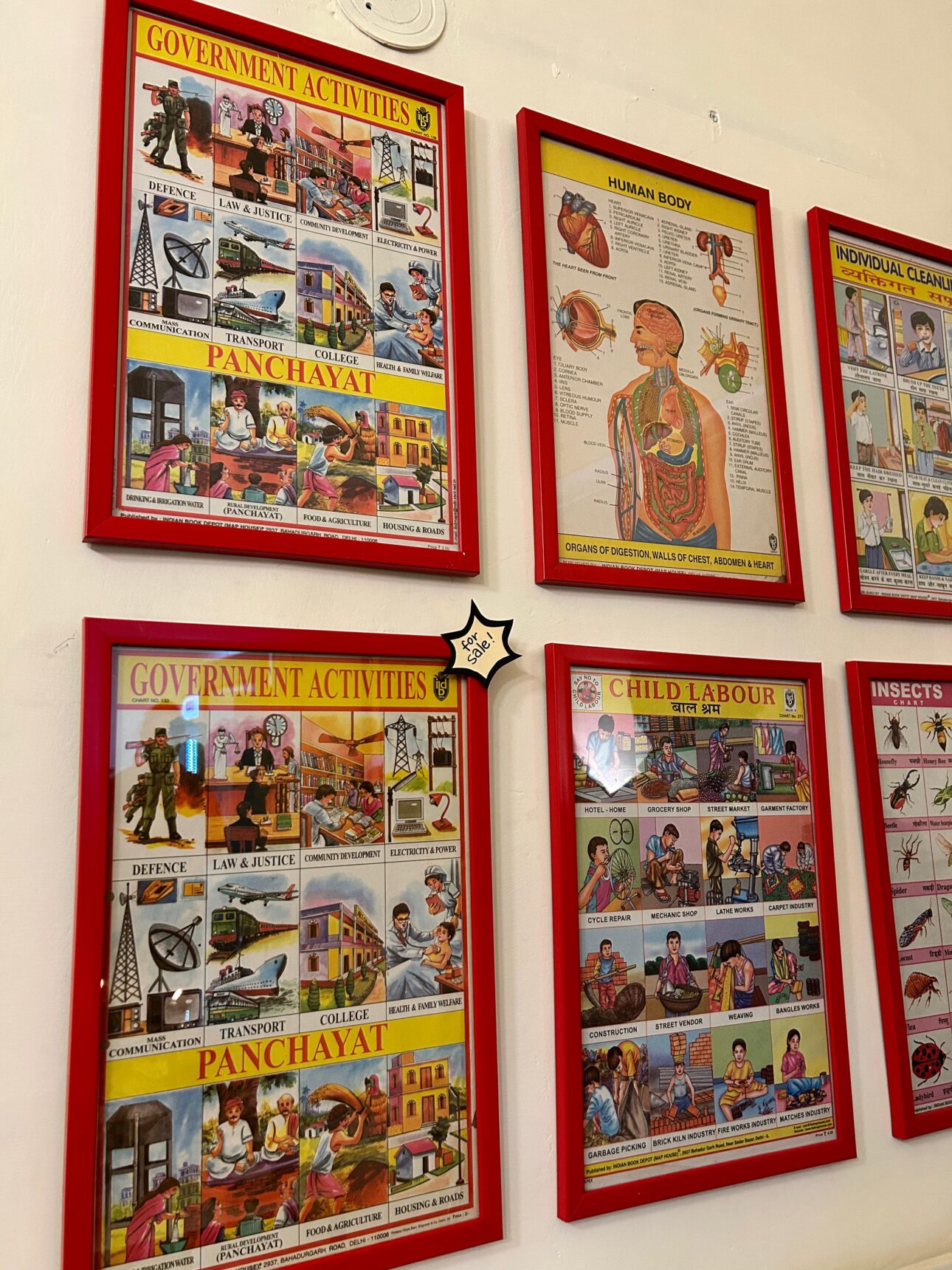
Mittal first started collecting records eight years ago when he met his friend Jeff Valla, an American who was visiting New Delhi from Ithaca, New York. Valla, who worked at a popular record store in Ithaca called Angry Mom Records, loved bands like Radiohead, Can, and Spiritualized, as well as more obscure Indian rock and drone music. “My friend and I were hanging out in the market and this guy was busking,” Mittal says. “He approached us to ask for a lighter. We later realized he had one—he just came to us because my friend was wearing a Led Zeppelin shirt and he was looking for some friends. He introduced me to records. Before that, I didn’t know how they worked, which were valuable, how you can tell the grading of a record. He also showed me a 1969 Janis Joplin cover by Usha Uthup Iyer. I didn’t know there was rock music in India until then.”
Mittal was in law school when he met Valla but was losing interest in becoming a lawyer. He started selling records, which he was often drawn to because of their unusual artwork, as a way to afford buying more for himself. Sadly, Valla died five years ago from a brain tumor, but his influence continues to inspire Mittal. “He changed many lives, including mine,” Mittal says. “In a way, this is all my tribute to him and what he taught me.”
In addition to honoring Jeff Valla’s legacy, the store, and Mittal’s work in general, is an homage to the everyday sounds that soundtrack Indian life. One of the great joys he gets from finding and archiving obscure records is in making them accessible to people who thought they had lost the music forever. “I enjoy putting stuff up on YouTube that’s nowhere to be found,” he says. “Whenever I put songs like those up, the comments are crazy. I’ll read people saying that they’re hearing a song after four decades. People say stuff like, ‘My mother used to play this song when I was 6 years old and someone threw out the record. I’ve been looking for this song for decades.’ Imagine a 60-year-old woman returning to her 20s via music. If I can be that person, there’s no bigger blessing in the world than to give the gift of music.”
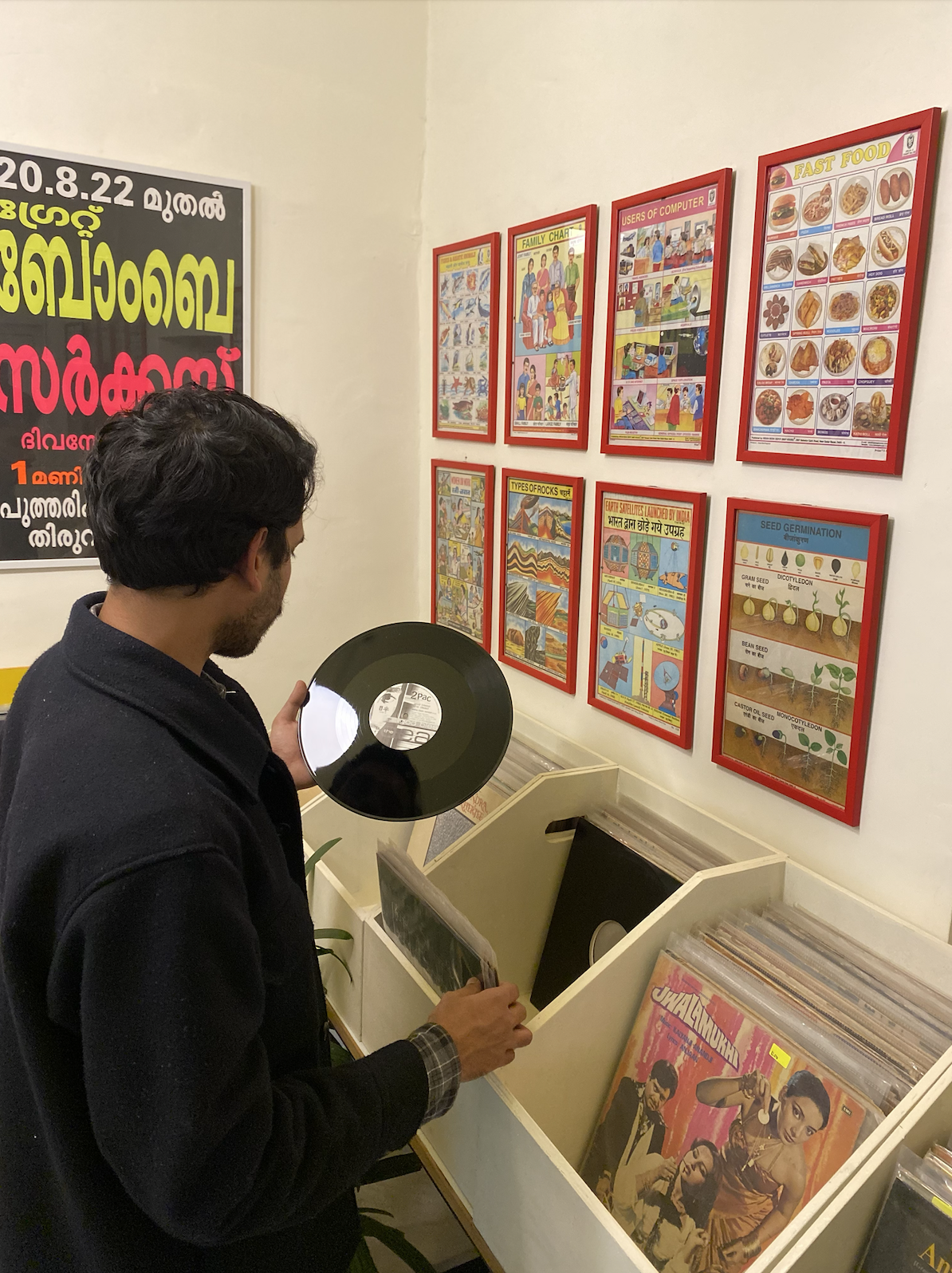
How do you find your records?
When I go to Bangalore or Mumbai or any other city for a gig or a listening session, I make sure to have two days to myself to look for records. But I also have developed a number of contacts over time who deal with antiques. When I come across an Indian record, unless it’s very new, I’m probably familiar with it. So if I see a record I don’t know, I definitely buy it. If I haven’t seen it in seven years, it’s probably rare. If it’s not Indian, I Google it to hear the sounds and buy based on price, condition, and sound. Deciding what goes in my personal bin or on sale is one of the biggest battles of my life.
My friend Shrey had a teacher give her a stack of records that she didn’t know what to do with once. She gave me those but I won’t be selling them—if you gift me a record, I’m keeping it for life.
What’s the most expensive record you’ve ever sold? The rarest?
The Indian pressing of “Bohemian Rhapsody” by Queen. Queen collectors are very hardcore. They want all the pressings of every Queen record: the Thai pressing, the Indian pressing, the Dutch pressing, and so on. They have 60 different pressings of the same album, basically. The Indian pressing of “Bohemian Rhapsody” is apparently super rare. I didn’t know when I found it.
Who’s the most famous person who ever came into your store?
I haven’t sold to a celebrity, but a lot of great musicians have bought from me, and I value that more than selling to someone in Bollywood or something. The people from Baalti have bought stuff. Rounak Maiti has. DJ Mocity, who runs Boxout.fm. Gaurav Nagpal [the producer Lapgan] came over to my house two-and-a-half years ago and bought a bunch of records. He took them to the U.S. and used a lot of material from the records and from my YouTube channel as samples on his project. I’m super glad he found inspiration from my channel. He’s fantastic. I can’t wait for him to get his due, and I’m happy I helped him in a small way.
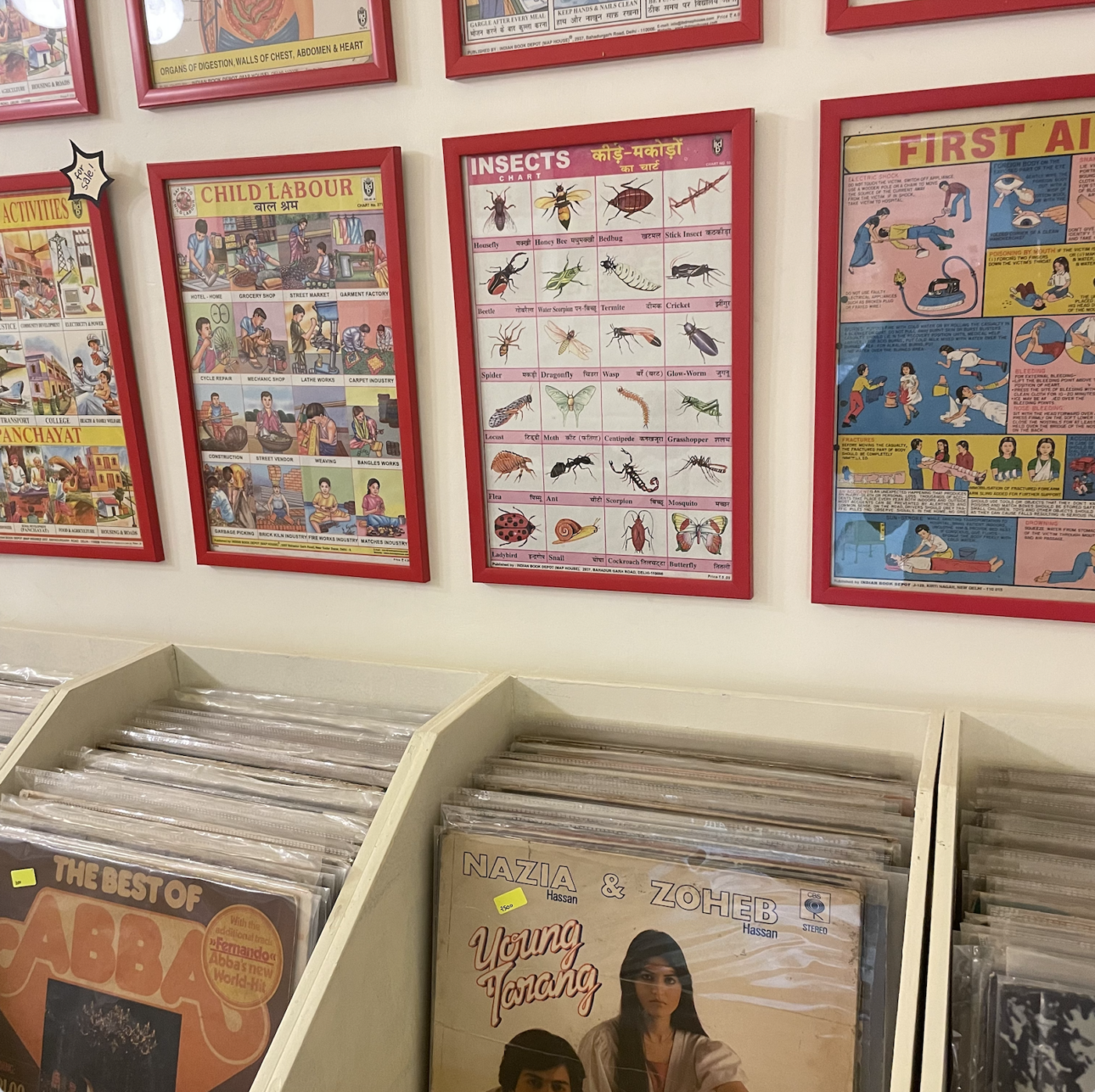
What was your first concert?
Probably an underground gig in Delhi. The first I remember going to was French Kiwi Juice. I saw him in Hauz Khas in 2014 or 2015.
Favorite album?
Madvillainy by Madvillain, High Violet by the National, and Songs of Love and Hate by Leonard Cohen. What’s common with these three albums is that I’ve listened to them for 10 years and they never get old. Sometimes I don’t even know the names of the songs on those albums because I just put them on and don’t pay attention to what they’re called. I know the album second by second—that’s how much I’ve listened to them.
I love Cohen’s lyrics and how depressing the National is. Madvilliany’s beats, lyrics, production, and samples are all perfect. I love the fact that there are so many Indian samples. My friend Akhil Hemdev runs a record store in Bangalore. We do these listening sessions where we talk about Indian samples. He collects a lot of hip-hop, and I collect a lot of Indian stuff, so I bring in the Indian sample on wax and he brings in the hip hop record that samples the Indian song. We’ve done three or four of these, and people are so amazed. We are trying to bring that to Delhi, maybe in the store.
Any advice for someone who wants to open a record store?
[Laughs.] Don’t do it, man… I don’t want competition, bro! All jokes aside—go for it, it’s your money to burn. I never see myself as the kind of person to give anyone advice.
Opening a record store is a somewhat risky move. Real estate is so expensive. Many people are shifting to selling online. But personally, I’d never know if I didn’t try. When I buy a record from a physical store, I remember when and where I bought it, even years later. It’s a fantasy of mine to give that feeling to others. And, I had to open a store because my house was getting flooded with records. [Laughs.] I needed storage space, so I thought I might as well open a shop.

